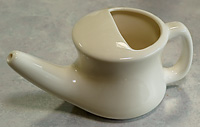You may have heard that many people use nasal irrigation for help with allergy relief. But rinsing your sinuses can be a big help for Staph and MRSA sinusitis, as well as other sinus infections. Nasal irrigation can take some getting used to at first. But once you’ve done it a few times, nasal irrigation is quick, easy and can be an important part of MRSA sinus infection control.

Neti Pot for sinus rinsing. Photo © Lester Moore
Nasal irrigation is typically done using either salt or baking soda, or a combination of both, diluted in warm water. Many people find adding in a mild antimicrobial to be of even greater help. Studies have shown that people with general sinus problems who irrigated their nose twice daily for three to six weeks saw significant improvement in numerous symptoms.
There are many irrigation aids on the market to help with nasal irrigation, ranging from neti pots (or nose bidets) to pulsating action mechanical devices. For me, my neti pot was a crucial part of breaking the cycle of antibiotic drugs and my recurring Staph sinus infections.
Sinus irrigation guidelines
Oprah covered neti pots on her show awhile back. Here’s some basics I and others have found helpful.
- The rinse solution most commonly used is one teaspoon of non-iodized table salt per cup of lukewarm water. Both too much salt and too little salt may cause burning, so experiment with the amount until you find a comfortable blend.
- A pinch of baking soda can help squelch any possible burning, but be sure not to overdo it. Too much baking soda will reduce acidity in the sinuses, which can promote unhealthy bacteria growth (which you really don’t want any more of).
- Start slowly. If you are not accustomed to sinus irrigation, it can burn at first, especially if your sinuses are really inflamed. I know mine burned a lot at first. Most people find that any burning typically gets much better after the first day or two.
- Rinse method: Stir the salt mixture into the water. If using a neti pot, hold the pot in your right hand and bring the spout to your right nostril. Lean over a sink and tilt your head so that your left ear faces down toward the sink. Gently tip the pot so water will flow into your nose. The water will run through your right nostril, into your sinuses and out your left nostril into the sink. Empty the pot halfway for the right nostril and then repeat using the left hand and left nostril.
- Most people get good results rinsing their sinuses twice per day. As always, everyone is different, so start slowly, experiment and find out what works best for you.
- It’s best to clean your neti pot thoroughly inside and out after each use.
Keep in mind if your sinuses are really clogged, the solution may not come out the other nostril. Don’t try to force it. You can breathe out of your mouth while you irrigate your sinuses.
Extra sinus care
For added antimicrobial action in your sinus rinse, you can add more than just salt to your rinse water. Some people have great results controlling sinus MRSA using Manuka honey. They add approximately 1/2 teaspoon of Manuka honey to a cup of the warmed water and salt solution. Get a high quality UMF 10 to 15+ grade Manuka honey for the best results.
I’ve had good results adding therapeutic grade essential oils to my rinse solution. A drop of either eucalyptus oil or tea tree oil in one cup of solution is enough. Just be careful: essential oils can be “hot” and irritating in the nose, especially if you are new to sinus irrigation. And I would not try this with store-bought essential oils as many are not appropriate and can have dangerous chemicals in them.
Sinus rinsing can be a powerful part of your infection control strategy. But do remember that any treatment or remedy by itself is usually not enough to stop a stubborn infection. External Staph and MRSA infections may be related to internal infections which need to be addressed for best results. And boosting your immune system, avoiding infection-feeding foods and getting the right medical care are equally important, especially if you’ve had recurring infections.
To your best health,
Michelle
Microbiologist and Natural Health Expert




